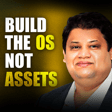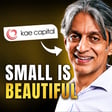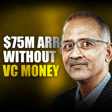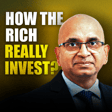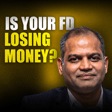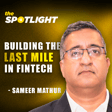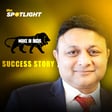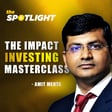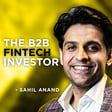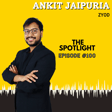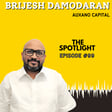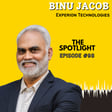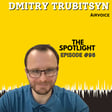Become a Creator today!Start creating today - Share your story with the world!
Start for free
00:00:00
00:00:01

Parth Chadha lays out the monetization strategies for next-gen creators | Stan
In an age where conventional career paths are being taken over by emerging paths such as content creation, YouTube, and influencer roles, discover how even with a modest following of just 1000 true fans, people can now start their journey as influencers. Parth Chadha delves into how Stan is reshaping the industry by bridging gaming enthusiasts and content creators with their fan base, enabling monetisation opportunities. This episode offers an exclusive look into what's next for the influencer world.
Get notified about the latest releases and bonus content by subscribing to our newsletter at www.founderthesis.com
Transcript
Introduction to Stan: A Gamer's Companion App
00:00:00
Speaker
yeah Hi, everyone. I'm Parc Chaddah. I'm the founder and CEO at Stan. um Excited to be here.
00:00:12
Speaker
Like, you know, what's an elevator pitch of Stan? Okay, you put me in a tough spot. But that's, that's like the usual one. So yeah, um Stan is basically a gamers companion app. um Gamers basically come and engage with each other with other you with your favorite youtubers, they can play collect, ah earn on the platform. So it's it's it's more like our Discord plus plus ah for the gamers. So we are essentially solving the problem of gamers lacking sense of belongingness and ah connecting them with their favorite KOLs and YouTubers.
00:00:55
Speaker
ah but Describe the platform to me. What does the app look like? what What's the look and feel of it? What's the user experience of it? So basically, um it's a mobile app. You will find it on the Play Store and App Store. um Currently, ah we are trending on number four, by the way, on the Play Store. So Stan, you download it because either you play um ah you know these games like BJMI, which is PUBG Mobile, Free Fire, Call of Duty, or you watch some of these famous YouTubers on YouTube, which just play games and have fun. So that's the reason you download Stan. and then
00:01:31
Speaker
When you come to the platform, you have a you know you you have you see multiple features there. So you either ah you know collect these cards, which are trump cards of your favorite YouTubers, and ah through that you get access to audio rooms, like the sense of Clubhouse or Twitter
Features and Community Engagement on Stan
00:01:51
Speaker
spaces. right So you get to talk to talk to your favorite YouTubers.
00:01:55
Speaker
and you can launch custom game lobbies from that. Let's say I and you want to play a game quick game of PUBG Mobile with our favorite YouTuber, for example, let's say Jonathan, who's like the big guy, who's got like 10 million subscribers, right? So that can happen on Stan.
00:02:12
Speaker
And ah while all that happens, you can engage with the other gamers. There are fan rooms, there are ah you know ah chat rooms, then there there's a unique way place where you can collect and buy ah gaming cords. So NetNet, it's like a community platform for gamers, where you can ah typically you know get involved in all the things which a gamer goes through in his you know daily life.
00:02:37
Speaker
These rooms are what, are they like Facebook groups? or so again you know I have not used Discord also. so Okay, i then it becomes slightly difficult, got it. So it's basically you, um it's like you, ah me and a bunch of other gamers, we are on Stan, on this custom club ah clubs called Stan clubs, where it's let's say labeled as play BGMI and have fun.
00:03:02
Speaker
Right? So let's say 70 of us are in that club and the hoster, which could be either you me, or it could be a famous YouTuber, he drops in some messages and custom game room ID, where if we use that in the game of PUBG, we can jump in the same room and all of us can play together in the game of PUBG.
00:03:23
Speaker
right So basically the community thing happens on Stan, the gameplay happens on their respective game apps. right and and And everything apart from commit like just playing, like you can follow your favorite creator, you can gift the creator, you can basically buy his collectibles on the app, and if you buy and upgrade his collectible, you get a signed jersey or a meet and greet, or you can even earn ah game codes, redeem codes, So ah in a gamer's life, there are a lot of rewards, which are very fascinating, right? but Like it could be fan rewards. Like I'm a big fan of some guy. I can actually get a chance to play with him. Or it could be game rewards. Like it could be game currencies, like PUBG's own currencies, free fire diamonds, Google play redeem codes.
00:04:11
Speaker
Or it could be like, um you know, cash rewards by participating in tournaments, right? So all these rewards and that sense of belongingness that, hey, you know, I am friends with Akshay and we both are on Stan and we chat with each other and play with each other. That community, um the sense of belongingness is what Stan is helping in the gamer's life.
The Growing Indian Gaming Market and Stan's Vision
00:04:33
Speaker
So when you're actually playing PUBG at that time, you can have your community within PUBG only, right? Like you can talk to other people who are playing PUBG with you. But if you want to do a custom game room with with your YouTuber, all that features are not in the game right now, right? And also you can make more friends on the stand platform. You can do a bunch of other stuff by apart from just playing, right?
00:04:58
Speaker
Oh, so you can discover a community basically. You can play, chat, meet, you know, a bunch of stuff. Yeah. I mean, we've we've kind of, you know, elevated the experience of communities in gaming. That's what I would say in one line. um Why is this a...
00:05:19
Speaker
Why is this an investable business? If I were a VC, you know what what would be your pitch to me as a VC? Why is this a venture-backable business? Oh, great question. I mean, the day we started, we had to get answered to this question because either it it's an investable VC business or it's like a bootstrap model we go it with, right? So see, India itself has 500 million gamers and beyond that, right? And it's growing very rapidly. So market is pretty huge and global market is a lot more, more than that and a lot more mature, right? And India is on a very,
00:05:57
Speaker
interesting standpoint right now where gaming has become our lifestyle, right? And ah so I have seen that the gaming industry has seen multiple waves. ah Earlier we used to be called as the DAU farms, right? that that Let's say India is mainly users. You don't see users buying and playing and paying us, right? But now you see there's so many interesting avenues where people are spending money in the game.
00:06:25
Speaker
Right? Like in-app purchase business has ah become so successful that like you've seen like $700 million dollars in India just from in ah non-RMG games on the Play Store. So it's a very soft. RMG? So RMG is basically real money gaming. So gaming has different buckets, right?
00:06:43
Speaker
ah So NetNet, what I'm trying to say is um the market is pretty huge. um It's close to like $3 million dollars in you know in in the market size today in India. And it's growing very rapidly at more than 40% kegger, right? $3 million, what is this number? $3 million dollars is like a cumulative sum of ah you know the money spent but money spent in the gaming world, be it any kind of games in India.
00:07:11
Speaker
Right. And this could be across ah categories, across avenues, like it could be platform, it could be game, it could be like all those ah places where people are spending money. Right. So ah big market, ah good business and rapidly growing.
00:07:28
Speaker
So these are something which and VC loves, right? And then this could, yeah so Stan could be like a billion dollar ah idea and that's what we are chasing and whoever comes in and invests right now would get a good multiple as we keep growing rapidly. So definitely it's a very interesting and vegetable business.
00:07:47
Speaker
What are the gaming categories? So you spoke of real money gaming as one category or what else to help me understand the ecosystem. Yeah. Yeah. So ah typically it's bucketed into esports, which is like games like which are played for the media which have multiplayer and you know streaming so like the likes of bgmi free fire call of duty valor and dota then there could there are games like real money gaming which is ah the likes of poker ramy fantasy like skillways people are putting in money
00:08:19
Speaker
then hypercasual is a good category where you see games like Ludo, Carim, Flappy Bird, Farmvale, right? And then there could be time killer games, strategy games, ah ah where time killer is like just you know spending time on the game, like 2-0-4-8, which could be like an overlap with hypercasual. And strategy is something like where you need to build your you know ah things in the game, like ah ah Roblox or GTA and stuff like that, right? So these are different sort of genres, which we see. And obviously then this could be further bucketed into FPS, MMORPG and just give you the full forms of of the like f FPS is first per person shooting games.
00:09:06
Speaker
Okay. So basically is FPS right. And then, you know, there are like various, various sort of games where you would see um like different, different categories should define these games, but net net, which I have given you is,
00:09:24
Speaker
ah I mean, role-playing games is part of esports as well, right? MMORPG, which I was talking about, so online games. And all these games ah could have an offline version, could have an online version,
Monetization Strategies for Creators on Stan
00:09:38
Speaker
right? Online is when you play with the multiplayer, ah somebody sitting in Delhi is playing with somebody in Bangalore, right? So stuff like that. Okay, got it. so I'm assuming that real money gaming hyper casual gaming none of these need a fan engagement platform because I mean there is no.
00:09:58
Speaker
There's no deep engagement with the hyper-casual game. There's no deep engagement with real money. It totally depends. in it for the money if If somebody is streaming the game and people are liking that guy or, you know, the that streamer, what she liked like to watch him. Like for example, a casual game like Among Us, ah which is like as simple as ah Mafia, which we used to play in real life, right? Like Villager, Thief.
00:10:27
Speaker
and doctor sort of roles, right? Which you assign and then you have to figure out who's what. So that game is like among us and it's a very hyper casual, but yeah ah there are content creators, YouTubers who are streaming that game and I'm watching it for fun. So I could be a big fan of of that game and and that streamer, right? So there's fan engagement on an individual level and also on a game level as well. So if I'm, I could be a big fan of Ludo and I could be part of the Ludo community.
00:10:58
Speaker
right? And there could be guys who are like streaming gro and having fun, right? So totally depends on um how we are looking at it. But what does your data tell you? What kind of game see engagement on stand?
00:11:12
Speaker
Oh, I mean, we've got a very big community on PUBG Mobile, Free Fire, Valorant. And we do see hyper casual games like Among Us, Pokemon Unite. I mean, these are the names which you will see content creators on YouTube, which are live streaming these games or putting videos and content around it. So these typically these are like some of the very popular titles in Indian market.
00:11:38
Speaker
So I'm guessing then a key... yeah ah asset for you is to get the creators on the platform. Like if you get creators, the fans will come automatically. It's one of it. I mean, uh, last year, obviously when we just started, we were building a brand that, you know, people don't know what is Stan exactly. And now, uh, and that's when we onboarded a lot of creators, the top tier ones. Uh, but now there's a very big, long deal of creators who want to come and partner with us.
00:12:09
Speaker
Because there are two stakeholders in the entire stands ecosystem. One is the gamer himself and the other is the creator. And this gamer could become a creator as well, right? A creator makes money, gamer spends money, right? Or gamer earns the rewards, which I was talking about, like fan rewards, game rewards, and so on and so forth.
00:12:29
Speaker
um Because creators are getting a chance to monetize very early, which they are not getting on any other platform in gaming. ah Typically they'll they do YouTube, right? And YouTube does not help them monetize day one. But Stan, you can just start a club on Stan app and you can start monetizing with maybe just like 30 fans of yours.
00:12:51
Speaker
So that is one big reason why these guys come to Stan organically now. And we have like a very strong partnership with 500 odd creators in gaming. um I mean, there's a very long tail of 1,000 plus creators, which are looking forward to you know onboarding on Stan. But we are very selective at the moment. And we have like all the top guys, mid-core guys on the platform. And yes, you are right to some extent that if the big guys come, the big creators come, they bring their fans.
00:13:20
Speaker
and and And that's the announcements which come out on the platform and on our social media. And that brings us a lot of gamers on the platform. What's the pitch to a gamer? You said a gamer can start earning from day one with just 30 fans. Help me understand what is it that allows you to start earning. You're talking about the creator? Yeah. So basically there are clubs on the app, right? On the clubs, I can have ticketed experiences. Like I could just put a ticket to the club, which could be a card. It could be like a token or NFT. Totally depends on the creator.
00:13:56
Speaker
Right. ah Through that, if somebody buys that, they get a chance to talk and play in a custom game room with that guy. Right. So that sort of revenue goes to the creator. Right. And then the creator can obviously unlock more and more stuff like he can, he or she can sell more, um, you know, uh, things ah like if he's launching a merge, he can, you know, talk about that on his club. Uh, he, he can, he can. so list his digital collectibles on the platform, ah right? So he can also grow his other communities through Stan, right? And that's these are certain ways where these creators are really looking at monetizing through the platform.
00:14:36
Speaker
And I can tell you some numbers like it's been like an year of ah you know us being operating in the market and we are close to 3 million plus gamers on the platform with close to 300 odd creators which are live on the platform and these creators have earned or made money close to 250k 300k us s dollars in in the last one year and that's pretty huge number if you calculate because uh today creators just have like youtube ads uh as the premium you know earning model and ah the ads come in favor of you if you crack the algorithm track your youtube
00:15:16
Speaker
Dashboard and things like that and there's no micro ticketing I cannot charge my let's say if I have a big fan who wants to give me let's say like a thousand dollars I could quickly make that money on stan I could launch something very exclusive like there are there are cards on the platform which can actually give you ah live meet and greet like a in real life experience so there are some fans which actually got to meet the top esports players through through stan and that have been very revolutionizing like those videos have been pretty viral like five million views six million views and you would actually see fans ah you know getting a hug with these esports players touching their feet in fact like they are like very big ah you know admirers of these youtubers because these guys have become
00:16:00
Speaker
the next-gen celebrities, right? And and the and the younger generation, the Gen Zs and Millennials are relating more with these guys as compared to the sports athletes and, you know, Bollywood celebrities, right? And then gaming is now much more larger than entertainment and, you know, Bollywood, right? That's what even Vishal Mukesh Amani has quoted, and that this this is going to overtake whatever we have. um Okay. ah What are the kind of digital merchandise that they can sell? So one is you're saying a ticket, which is essentially a buy-in for an experience. It could be a gaming experience. It could be a real life experience. And then you spoke of other digital merchandise. Like andn like you could sell any collectible, which could be coupled with any anything exclusive.
00:16:48
Speaker
right? like Like let's say you can launch Akshay's card which will give you assigned sneakers like if you launch your sneakers brand or it could give you time with Akshay like you and me chatting as a fan and a creator, right? It could give me a live match with you. It could give me um or in real life meet and greet right and it could it could give me what else like a signed merchant you know jersey and so on and so forth right so there are a lot of things and the creator decides what he or she ah could sell to to the fans right and obviously there is a lot of economic play on the platform
00:17:30
Speaker
which is driven through the stand coins, which is our way of monetizing and the share of the coins which are directly linked to you as a creator goes to you. So that's how the entire model works on the platform.
00:17:46
Speaker
ah help me understand this standcoins model I mean, ah we are monetizing already. we are We are not a community or a social media platform, which is not making money, right? We were very ah you know straightforward and upfront that we need to build a business here. So we thought what's the best way to uh, sort of create wedges and avenues to make money as a business. So we launched a platform currency called Stan coins day one, uh, and that's your entry point to do anything on the app. So you as a gamer or a user would buy Stan coins with the coins. You can buy those tickets, those cards collectibles, uh, custom game lobbies and so on and so forth. Right. And those coins get circulated and I could sell you my collectible as well. You can trade these cards with me on the app.
00:18:38
Speaker
Right. And that's how the coin even rotates. And and it's like a simple in-game currency model, right? Like, for example, if you're playing Clash Royale, which is a very popular game, you buy those ah currencies and you keep on spending, spending, and then at some point you feel, okay, I need to buy more. And then you buy more, right? So ah it's so so it's a community platform with a platform currency called Standcoins, which app actually helps the entire economy to be you know driven on the app.
00:19:09
Speaker
So, stand coins are the only currency, like if I want to buy a no yeah digital collectible or anything, I will pay through stand coins. Yes, yes, yes. So, that's a centralized currency, one unified model where we are using. And what does, is it like one rupee, one stand coin or what is it? Ten coins for one rupees.
00:19:29
Speaker
Okay. Okay. Okay. And, uh, do you have to pay the Google play store tax on this? Yes, that that that's inevitable. And we have to go. And obviously, I mean, we, uh, it's a lot and that kind of discussions are already, you know, in the way that Google and You know, Indian government is sort of, I think Supreme Court has challenged that and and they have started an alternative billing where you can get a discounted billing close to like 17, 15% or if you offer that. ah But Google Play show gives a lot of distribution to us. I mean, that's also a lot because like we are trending on number four on the Play show.
00:20:11
Speaker
Right? And that brings a lot of users to us who are gamers. And I think then there's a lot of trust that comes when the the app was on the Play Store. And it's it's like cooperated, and like the ratings are good. So we are OK to share some percentage to Google on that. OK. Interesting. I'll come back to this. There is a recent development of Epic versus Google. I would want to hear that from you. But yeah. OK. Got it.
00:20:38
Speaker
so ah ah like a A big fan of a game will essentially come on the platform. They will buy stand coins to do in-app purchases. It could be ah digital collectibles of the people that they admire. Essentially, it's that only, right? People that they admire, they buy digital collectibles. And also the coins help them to sort of engage with other gamers on the app.
00:21:03
Speaker
so netnet play with other gamers, play with your favorite creators, engage. with Why do you need coins to play with other gamers? I mean, there could be a custom game room where there's entry through the coins, right? yeah Okay. and And then you need to put it. Yeah. Yeah. Okay. Got it. So so somebody could create a game and charge people to play in it. Okay. Yes. and Understood. Okay. Okay. Got it. Okay.
User Engagement and Monetization Feasibility
00:21:30
Speaker
ah And so that this, uh,
00:21:34
Speaker
The stand coins, what kind of spends come to you and what kind of spends go to creators? Like if I'm buying a digitally collectible. It's totally dependent. I mean, creator to creator and content to content, it it varies big time. I mean, there could be.
00:21:52
Speaker
objects or SKUs where the creator gets directly 30%, there could be like even 50%. Totally depends on ah what kind of SKU is being launched and creator also, right? ah like If it's a big creator, what kind of percentages we sign? Some of them some of them are not on percentage basis. Some of them are like you know minimum guarantee that Stan is going to pay them and they give you know, ah X kind of deliverables across the partnership and exclusivity and so on and so forth. So it's a very mix and match model right now. ah Let's say for a small time creator who's not a big celebrity. It could be it could be even 50-50 like you as a creator could make 50% on the entire purchases which has happened to you or your collectibles which are launched on the stand platform.
00:22:46
Speaker
Right. Okay. Yeah. And what about like someone creates a game room and you have to use coins? Do they get anything there? I mean, ah let's say you and I, am ah we are playing together and so we will take a cut rest goes to the guy who creates the ah game pool. Okay. Okay. Understood. What is the ah split between people who are gamers versus people who go beyond playing and do stuff like watching other gamers live stream and you know that that level of fandom. So what is the split there?
00:23:29
Speaker
I mean, there's no there's a great overlap. um like ah What happens is these guys are like what like consuming gaming, let's say, seven, eight hours average in a week also. right like they're They have some favorite YouTubers who are watching. And and some of these guys are really ah super involved, who are like super fans, who would watch each and every stream of these guys.
00:23:56
Speaker
Right. And there then there are just gamers who are like casual gamers. Obviously, that would be, let's say, close to 30, 40% of the entire gaming audience ah who would just play. Let's say i like I'm ah i'm ah a guy who would just play and not watch. Right. And then there could be a situation where I really like the creator and I will watch his dreams. So it's a very mixed and overlapping. But people actually are very much inclined towards either learning game or having fun by watching it. right ah So it's a totally different motivation for a gamer to sort of consume the content.
00:24:36
Speaker
Yeah. So let's say, you know, if there are, let's say a hundred million gamers for these esports kind of games, the more involved ones out of that, would you say like 10 or 20 million would also be doing this deep level of fandom where they are. It's a lot more than that. I think in India.
00:24:57
Speaker
If I tell you like pe I can give you like a ballpark figure where um let's say PUBG Mobile clocks 25 million monthly active users. So you could say that 5 to 10 odd would have watched at least one stream of of these games online on YouTube.
00:25:17
Speaker
And that's just one game I'm talking about. So if you look at all the other games, I think there would be a base of close to 30, 40 million users in India who are actually actively consuming gaming content. It could be any sort of content.
00:25:34
Speaker
Okay. And because in games, you typically end up doing in-app purchases. so So this audience is easier to monetize because they're already doing in-app purchases. So it is not a far stretch for them to do an in-app purchase on Stan.
00:25:51
Speaker
there There are motivations which drive in-app purchase, right? If you are hitting the right ah use case, people will pay, right? Like the social angle, the you know the creator and fan angle, I think definitely wants gamers to spend, spend right?
00:26:08
Speaker
Or if it's helping them win more rewards, which could help them in the journey, then it it also helps them a lot. Let's say if I want to buy something in a game of PUBG, I need, ah so I can actually buy it by using Redeem Courts, Kogel Play Redeem Courts. And if I can win those Redeem Courts on Stan, it's a big win for me as a gamer. So it's sort of enabling his entire, you know, economy in the gaming life.
00:26:37
Speaker
And how do you win the team codes? Oh, you play the contest, you play these, uh, custom game rooms, uh, like the price pools have these, uh, game codes and reading codes as, as the, uh, for the gamers. Uh, so are you integrated with the games where you can get to some of them, but some of them. Okay. Okay. Yeah. Yeah. Some of them have given up, given us API. Some of them it's it's more like a manual work, which we have.
00:27:06
Speaker
So like like your team will validate who and and then? Yeah. yeah okay Okay. And the ones which have given you APIs, what do you get as a result of the API? Well, everything we have your if you have we have your data, we have what kind of games you have played in a day, how much have you won, what kills or you know ah parameters, whichever are related to the game, we'll get everything with your game ID.
00:27:30
Speaker
And those could go on my profile for like ah bragging rights. Yeah, absolutely. That's also one big thing which these guys get a unified game profile in stand. Like you could actually see your PUBG profile, your free file profile and badges. You get badges for achieving certain milestones in the games. Okay. So it's net net ecosystem play for a gamer, right? So that the helping a gamers life evolve.
00:28:00
Speaker
Understood.
Parc Chaddah's Journey and Industry Challenges
00:28:01
Speaker
Understood. And so and ah what is the value of stankoins sold till date? I can't give you my financial numbers right now. ah I mean, we are waiting at $2 million ARR. That's what something which I can disclose. So and predominantly it's through the coins itself. It could be the only like largely coins and there's nothing else. right yes Yeah, nothing else. OK.
00:28:29
Speaker
Okay. Okay. So this year you'll sell about two, two and a half, ah something like that. Million words. Okay. Okay. Okay. Interesting. And ah where is your audience? Is it, like is it an India based app primarily or currently in India? Yeah. Okay. ah Are there comparable companies in the West?
00:28:53
Speaker
um Not really. um I mean, there's Discord, there's the games itself. There will be community apps, tournament apps, but not what Stan is building as such. We don't see that exactly coming out.
00:29:10
Speaker
A community app would be similar to standard, except yeah, but you're also allowing them to... ah The creator and fan angle, the the the custom game rooms, I think these are not existing. like This is something unique inside which we saw ah through YouTube super chats and YouTube chats on the live stream. People wanted to play with the guy, people wanted to... you know we They were ready to spend some money to get into the same game, right?
00:29:35
Speaker
And this was going across the chats of these creators. And I and my team, the leadership team at Stan, I'm very fortunate to have some really amazing co-founders with me. And we were part of this ecosystem from long. We used to work with these creators very closely in our past experiences. And we could see like their fans and gamers wanting to spend, to sort of create, and also lacking that sense of belongingness that they want to make friends, they want to connect,
00:30:03
Speaker
apart from just the game, they they have a life after the game, which is a social life. So this these are the things which we felt that there's a very unique proposition which can be played upon. And if you go build into a but business like it's Bingo, like that's where we started up in first place.
00:30:20
Speaker
ah Tell me about the journey of building stands. So this is not your first venture, right? No, it's not my first. So quick intro, it's been like seven years for me in the gaming space itself. I started as a dev in 2012-13. In my college days, I used to build hyper casual games. um And ah then I... You would build and publish them under your name or as a freelancer? So I was a freelancer. I used to ah give games to whoever's looking for hyper-casual beat platforms. Like I've given games to Flipkart when they want to some do some gamification on their platform, right? So ah ah that's how I started with basic HTML5, Cocos 2D sort of.
00:31:05
Speaker
ah engines where I would ah you know code hyper-casual games with because gamification was exciting. It had just got started. And then I built a large game, ah which was a very and interesting IP, basically fusion a fusion of ah sports and a very popular game called Bingo, which is Housie or Tambola in like different ah regions of India, so kind of connected these two ah two things together and built a very unique game. um I sold it to a platform. ah They went ahead and made it live in a very small ah you know um ah feeling. i could I can't give you the name, but a very large OTT player bought it. and That's where I started feeling that this is something exciting to build on as a category.
00:31:59
Speaker
right and um After that, I build ah and scaled my first gaming venture, which was like proper venture, E-War Games. um It was a real money gaming platform. You quit your job to do this? like like Yeah, I heard. Yes, I did. I did a stint for three years at JP. a Very interesting time. As a coder, as a software developer, I built some really um you know exciting ah features and you know things and in the bank, but very boring job because ah you know how the banks operate and coming from a gamer's
00:32:41
Speaker
uh you know ecosystem and excitement was always on the peak and i could see that gaming industry in india was picking up big time i used to like chat on linkedin with a lot of these leaders from the various companies in gaming uh and fantasy poker ramy were obviously the poster boys and right and cash cows as well. like People were scaling businesses big time. ah So i ah my obvious choice was to look at sports and gaming together. That's where I started the first game, which I built, called Cricket and Bingo, um or Run Bola. We had trademarked these two things and sold the game to an OTT player. And then um then I realized that there's something. You built a gaming studio, basically, which was making games for
00:33:32
Speaker
ah whoever was ready to pay. So it was just me and my co-founder back then, which this is the first game I'm talking about. right ah And then we realized there's something called as game of chance and game of skill, ah which was something very interesting, which we learned over a period of time by understanding. Why is this ah distinction important, game of chance versus game of skill? Because it is it is really, ah I mean, as per Indian government, you cannot
00:34:03
Speaker
a run wage ring or let's say money in money out on game of chance. That is pure gambling, right? it Typical example is let's say betting sports betting or or team but the which is not a game of skill it is pure luck and if you put in money you are like a sort of promoting gambling and India it was not uh uh something which was very like it was not allowed right and and the bingo which is housey or tambola uh is sort of a game of chance right so we had to now realize that how do we make it a chance a game of skill
00:34:44
Speaker
right And then we will we built then I started my first journey, um like first company big time called Ewar Games in 2019 after JP and all my you know freelancing gigs. um And that was a real money gaming platform of skill games.
00:35:04
Speaker
um ah That's when I really ah you know ah spen got my hands dirty with understanding the RMG ah you know ah user base and and market, how the distribution channels work, how how what's the user's insights, how do we actually scale it big time. There were a lot of interesting learnings and takeaways from this business.
00:35:28
Speaker
yeah can you you know I want to understand this real money gaming space a little better. First of all, how did you make bingo from a game of chance to a game of skill? ah We were not successful fully there, but what so I can quickly explain the game. So let's say there's a match of cricket where there's, let's say IPL, IRCB versus KKR and our CB is batting. So Virat and Kiriz Gail are playing and ah they would hit a six and six is the number which comes as a bingo number and you need to strike off if you have it in your ticket. Okay.
00:36:02
Speaker
So that's the link, how the thing happened. Now, to put in the scale, we added a trivia, like the moment you strike off the number, we would count it you know a valid if you actually answer a question, which could be a GK thing like, sholay me gabbar konta, or Virat's maximum runs. But it was like, just to plug in skill element.
00:36:27
Speaker
Then we, then what happened? Why do you say this was not successful? Who decides that this is not a game of chance? No, no, no, it was, it was a game of skill. And now after that trivia came in, but like my vision was to take it to a very big stage, right? Like imagine like World Cup is happening and it was a very interesting game because females were not very, you know, um involved in during cricket time.
00:36:56
Speaker
right so But Bingo is something which is very much played in the female audience as well. right So this that's how like our wage was to get more audience to the cricket game. and But the the platform which we sold to, ah they did not like do it big time. ah We thought we launch our own platform and then we will do it big time.
00:37:21
Speaker
right But when we started Ivar, we started with unique insights and then when we kept on building ad mode games, so we learned a lot, a hell lot of things, ah you know understood what exactly a gamer's mindset is in India and as um you know with with respect to real real money gaming. um We understood that poker, Rami, yeah.
00:37:45
Speaker
Pokhara and Rami are games of skill or games of chance? They are game of skill. How do you decide game of skill and chance? That's a very important and a unique thing to learn, right? So if you put um same guys and give them the same cards or same thing, like if they if they there is exactly the same winners coming out of the game, it's a game of skill.
00:38:10
Speaker
right ah So you would typically see in the tournaments those same guys repeating. Obviously there will be a randomness of what cards you get, but how you play the cards and create those pairs and stuff like that brings in a real skill element there. And people would really, really wager a lot on these games. Fantasy Dream 11 became super, super ah big in the market and they taught people that ah You can create a team of 11 and you know very interesting stories, which we learned from football fantasy, cricket fantasy, and then Ludo, which was again a very unique game in India. ah We did something revolutionizing there as well. So Ludo was a game with dice, right? A proper game of chance, right? Now we created a Ludo without a dice.
00:38:59
Speaker
ah Somebody would ask me, what ah you would ask me, right how do you play ludo without red eyes? So we created a unique ah game where the moment game starts, you and me, if we are playing against each other, we get a sequence of numbers, the 30 numbers, 30 to you and 30 to me. right We will just play a 30 chance in the Ludo. We have those ah numbers to play. Now we are on the equal page and I can see, I will get three now, four next, five next, six next, three again. I can plan my moves.
00:39:35
Speaker
and right? With which, which pawn in the game to move, right? And then every step you take with the pawn, you get one point. So it's a score driven Ludo, where there is a unique way of skill at it. And it became super, super popular. um And now there are companies who are doing big time in Ludo, and ah very good learnings and E-ball days with respect to how to scale gaming platforms on, um, you know, in the Indian market, how to cater to tier two tier three
Transition from E-War to Stan
00:40:06
Speaker
audiences. Very low. What is the reason why you call it a gaming platform? Did you release Ludo as a game or like 25 games on one app?
00:40:15
Speaker
25 games on one app. You could put in money and then start playing any game and you will find players to play with. right So that's how basically a game gaming platform came in, but it's like ah very interesting. Are you allowed by Google Play Store to publish real money gaming apps?
00:40:37
Speaker
Only fantasy and Rami is allowed now, but if you put other games, you are not allowed. So we were typically operating as a ah APK. So you would typically download our app from the website.
00:40:50
Speaker
Which is extreme friction, right? It used to be, but one yeah yeah yeah correct correct correct even now it used to be, but it's more like um people got accustomed, the real money gamers got accustomed to it because Dream 11, the largest player, taught people.
00:41:08
Speaker
Right. That's how you do it. So okay that's how it it's running. So the market was already educated before you started that, that helps. Yeah. Well, like the second, third player, maybe third player as a platform. And, but we really sold a lot for, uh, distribution in tier three. Like we had users from like, uh, cities, like, you know, uh, and like.
00:41:35
Speaker
users coming from all over the country and low-end devices. I think people in Indore will object to being called tier 3. I'm not yeah like categorizing them. Indore would be what tier 2. I'm saying like tier 1, tier 2, tier 3, all these would be a mix and and how did you how did you onboard users from like you know beyond metros? I can tell you like these and they were using devices which were like damn low-end devices like all these you know Chinese phones um four thousand five thousand bucks which you che buy a smartphone with and it was a great
00:42:18
Speaker
ah success for India market like gaming took off because of these two reasons, right? Like internet became super cheap with geo and mobile phones became super cheap and mobile games came out to be very interesting play. Like before 2016 everybody was talking PC games and that's why the gaming industry was not flying that high.
00:42:40
Speaker
right And we used to pick hold of these YouTubers, create communities. Again, community is a very big angle in which to grow your business in gaming and reference. People would refer for each other, bring them to the platform. right So um these things and through the games, we had to really focus on how to ah how them how to make the game playable on very low end devices, very low bandwidth internets, right? Some villages also like people were having like 3G, not even 4G back then, right? 2G also people used to play games. So we should, we would test our games on low bandwidth ah that when exactly is the game breaking, right? ah To make it possible that everybody is
00:43:23
Speaker
ah able to play seamlessly. And there was money involved. So a lot of security has to be added in in the platform as well, because ah you know how it is, right? like people If there's money involved, people will you know look for opportunities to kind of ah you know pull pull out the extra cash from the system. To to game yeah yeah game the platform. yeah Exactly, exactly. So this is how these are certain learnings. And interestingly, like look at how distribution happened for you are as well, through youtubers and gamers is something which we really learned. And we felt that community fandom
00:44:04
Speaker
and Socializing over games is a big wedge to build on. and That's how Stan got committed. But why why not continue in the real money gaming category? That is a big category. There were two reasons. Multiple unicorns. Yeah, but but regulatory hurdles were coming our way.
00:44:24
Speaker
ah we would We were slightly aware of this GST issue which government was putting, like now it's live with the 28% GST. What is the GST issue for people who don't know what it is? So it is basically, um let's say if somebody puts in 100 rupees to play in let's say a platform, they would have to the platform has to pay 28% to government on that 100 rupees.
00:44:51
Speaker
Right. On the the person is only left with like that 70 or 72 rupees to play with. So it's a big hit for the gamer. Now some big players are ready to absorb their hit on their own in their margins.
00:45:07
Speaker
but almost a lot of new players or ah you know budding players were not ready to kind of financially cater to and you absorb all those hits, right? Because some people were actually operating at what, 10, 15% margins. Now, if you add a 28% GST, it would like hamper like things mad, right? So that is the big reason we also start sort of took this, you know, step that we need to move to building something which is ah proper business, which works well, builds on scale. And I was seeing this era of gaming where people wanted to play with each other and play with your favorite YouTuber, right? And a lot of content creators were, ah je you know, coming up. So creator economy is something which I feel that is not solved yet.
00:45:59
Speaker
ah Like if you if you meet anybody today, i like 10 people out of them, at least seven wants to become creator, right? Running a podcast is obviously also a creator sort of approach. It could be YouTube or it could be influencer on Instagram. So we saw there's a very, very big wave of creators ah come being boom come up and a lot of them try their hands on gaming because they know consumption of gaming is high.
00:46:26
Speaker
and right You would see non-gaming creators like playing games on on their videos and streams because they know that this video will work, go to the masses because gaming consumption are there. right so ah But how to solve for monetization? How to get these guys to make money out of it? So I think this problem statement came out very exciting and um that's how Stan got born and we you know moved ahead from a URL to Stan.
00:46:53
Speaker
Right. um And it's a value. Yeah. Even was profitable. I assume real money ga as a businesses. No, like it was like unit economics positive, like on the platform level, we were positive, but as a company, we were ah making loss that time because of marketing spend and.
00:47:11
Speaker
yeah Yeah, we were growing and in gaming, it's like you need to amplify things when it's working for you, right? You need to get as many users as possible so that the ah the you know numbers go up and then you're typically then turn it into a profit business. So we were doing your unit economics vice positive on the platform. And how much revenue were you doing when you shared it out?
00:47:35
Speaker
We were doing like close to a million dollar GMV per month, which is about seven, eight crores in GMV. So and our take rates were close to like 10, 12 percentage. So net net one to two crore is what our revenues were in a month that time. Amazing. Amazing. ah Which is like a.
00:47:56
Speaker
Phenomenally big business to shut down. how did you I mean, we had to take a call, we had to liquidate, we started selling the games, we started we sold the platform. I mean, it is a big decision, but obviously we as founders had to take a call, with how to you know move forward with
Stan's Positioning and Market Strategy
00:48:16
Speaker
it. We had raised some capital from uh, you know, VCs and, uh, you don't turn, ah you don't make it a small entity to make small business, right? You're, you're building a business for masses and you have to build like we we we were always excited about the scale and growth.
00:48:33
Speaker
And Stan is something which came up to me as a you know serendipity. And like the guys who are with me in the journey, they plan they were very excited about Stan. So it happened. And then I felt that this idea is ah you know a new generation thing. And this is going to take us to the global market. And this does not have that RNG angle to it. right So a lot of reasons where it helped us take the decision.
00:49:04
Speaker
So the idea of a stand came first or the decision to exit, Ivar came first? The decision to exit. Okay. yeah I'm still, ah I want to kind of learn from you how you take that call to exit a business, which is at a 10, $12 million dollars annual GMV. I mean, you're burning money, right? Either you get more people to put in money. So it was getting difficult to raise capital, right?
00:49:32
Speaker
So it's like and the the investors were telling you that there is a regulatory overhang in the sector. That's why we were educating the investors. Investors actually don't have the in-depth knowledge of categories because they are actually like investing in various categories. Right. So we we had a lot of discussions and then we took a call. I mean it was a mutual understanding. We had a lot of strategic interest to acquire the business as well. One of the leading fantasy players gave us a very good offer but ah you know things went south and we couldn't you know move forward and we have but very interesting insights because everybody who comes to acquire tries to maximize their output as compared to the other person's right. so
00:50:22
Speaker
I would say phrases like that and get to the and for the dealing being of five years yeah so getting logged in for you know many years and so on and so forth. right So there was a lot of shifts and then I think the regulatory hurdles were on the way.
00:50:41
Speaker
I think if somebody would have acquired us also would have you know felt later that why did we do this because that's the 28% GST thing was very very big it has impacted a lot of companies now a lot of companies have shut down and real money gaming and then I mean I started looking at the sports market, how how these gaming and socializing happen and Discord is a big product. It's a successful product in the Western market and India is it is on a declining trend.
00:51:12
Speaker
due to various reasons that it doesn't have anything apart from you know chatting and creating a community. And it's super complicated. It's not so much handy or you know localized or bespoke for Indian or emerging market. and right I'm sure that's why you also don't use Discord. A lot of people have that friction with using Discord.
00:51:33
Speaker
So, we felt that there is an interesting opportunity here and gamers is something which we really understand. We understand how, because we've been the gamers, I have like played built games, played games um and myself like looked at in your market and now I think we have really cracked something here because we have organically reached 3 million gamers. We are trending on like number four on the Play Store. we have We're doing a decent business as well. And now you know we are really moving fast, getting to as many gamers as possible and becoming the go-to platform for gamers in India. right Okay, interesting. So ah the entity remains the same for e awards and stands? No, it's a new company altogether. You started a new company yeah with a new capital and a new set of investors.
00:52:24
Speaker
Yeah. So, I mean the fact that you had to shut down your last company, did it make fundraise difficult? No, I mean, there was a decent, um, and like learnings we had, uh, yeah, you know, I mean, yeah. n twelve million zv yeah some vegetable Like we are very, we were very solid executioners and building a business is not like, uh, you know, everything is going to work out for you. Right. Um, and not, and not every time it you know hits the board, right.
00:52:56
Speaker
ah So, and investors really value that because um and second I found is I think there's a lot more maturity when I remember myself in the world days I was very different person and as compared to now I'm much more calm mature in my decision there's a lot of data driven analysis which we do there's a lot of um cur feelings which work now because we connect the dots backwards and remember, keith upowraha cow right right? So I think businesses are like that. Like I come from a business family background, so my parents have been into business for my grandfather days and um I could really, you know, put an analogies in place because we put this fancy word startup and VCs and investors, but net that it's like you're building up your
00:53:42
Speaker
you year You're going behind the market share, like there's a market either you're creating the pie or you are getting the share of the pie, right? um So like to your question, I think investors are really, you know, interesting bunch of people who really understand you, who look at who actually help you get some answers to the questions.
00:54:05
Speaker
so i did not and I have really good partners in Stan right now. There's General Catalyst from the US, there's ah Better Capital. There's an amazing bunch of people who have you know sort of partnered with us in this journey. so yeah Overall, I think the vibe has been pretty good. yeah okay Interesting. How much have you raised for Stan?
00:54:31
Speaker
so We had raised $2.5 million last year. as a seed round and that's when these names which I mentioned came in and very soon we are going to announce our next raise. You're planning to do another fund raise. What do you need funds for? what What do you want to use them for?
00:54:50
Speaker
I mean, till date, we have been very organically growing. um And we do have a product market fit now. We are making money. We have good retentions, which i'll see which we're seeing in the product. And I think it's the right time to scale the business and like get more users in. so i So marketing is definitely one place where we are going to spend um hiring the more good legs talent. We have an amazing team. like ah very fortunate to have these rock stars with me like 30 people sitting in Bangalore and everybody's like ah giving their best so want to add couple more guys who are really you know ah want to create an impact with stan so hiring and product and marketing I think pretty standard ah places where we're gonna spend the fun
00:55:42
Speaker
ah How will you ah yeah do your customer acquisition once you have funds? What's the strategy you've thought out? but There are various, I mean, it's there's some standard ways, there are some unconventional ways. Standard is typically those Instagram ads, performance marketing, and kind unconventional is basically creating those GTMs like, ah you know, partnering with tournaments and esports.
00:56:07
Speaker
ah getting more creators, like you know, and then getting to more communities in Discord, Telegram, wherever these gamers exist, right? And media buying, I think a good mix of all of these and whatever works, you amplify that and just keep scaling it, right? I think that's the way you scale it, right?
00:56:29
Speaker
So these, uh, tournaments are, uh, so they are startups, which are into this tournament space, right? Like I think rooter, loco, these are, yeah they are more like streaming platforms. So they are, okay. Uh, they are competing with YouTube, right? Okay. They're not doing what Stan is doing. Like we are not doing, we are not building another YouTube.
00:56:52
Speaker
Okay. Yeah. I mean, it's hard to compete against YouTube, undoubtedly. Is there a startup which is in this tournament space or is it largely unorganized? It is very unorganized. There's a lot of WhatsApp groups which are running. So that is one big advantage where we are sort of, you know, looking at it. So this could be another space for you to get into, like in terms of yeah tournaments.
00:57:19
Speaker
It's already running on the platform. So like the right go-to-market strategies are this only, like partnerships, adding these games which are working, which games have community, adding more creators, getting more long, you know, that ah long tail of ah budding creators. Like we have just started a stan creator partner program where people have applied. There's like 700 applications we have received. So we did stan fan fest last year in Hyderabad. We had,
00:57:46
Speaker
35,000 IRL people attend in in three days that was very very successful huge event for us um because we had like top 70 gaming creators coming in one place our users the fans they came in attended that event they got exclusive meet and greets and just like how youtube fan fest used to happen but stan fan fest is like beyond that in terms of gaming itself so a huge success so a lot of creators reached out to us so this time we did a stan creator fest in you know in 2023 in Hyderabad again and we had it we had like close to like 150 plus creators in one place and then we opened up for
00:58:28
Speaker
all the budding creators, we made creators talk to each other, what is working, what is not working, sort of educating that. So I think these are the GTMs which are really working for us and we will double down on these. Strand Fanfetch 2 is what is coming up in 2024, where we do a much larger IP.
Advice for Founders from Parc Chaddah
00:58:46
Speaker
um A lot of brands are excited to partner up with ah with these with this IP for with us because the right gaming TG comes to attend those that event, right? ah So yeah, I think these are some unconventional ways where Stan is kind of you know creating an impact and acquiring our users. ah Do you think earning from advertising dollars is ah another revenue source for you? Absolutely. Absolutely. Why not? like we have a car How would do it that happen?
00:59:18
Speaker
We have a platform, so we could immediately start ads, we could promote other games. We've experimented a little bit on that as well. And it's coming out really interesting, but we would to be selective about which brands because the conversion should be higher, the audience should like what we are promoting. I think, but yes, advertising dollars would also be a way to sort of, you know.
00:59:40
Speaker
build revenue but okay okay interesting interesting ah In a way, one could say that Stan is like the only fans for gaming content creators. apart from all the nudity and the negativity. Yeah, but you know how... It's a cleaner OnlyFans. Yeah, I mean, OnlyFans is essentially relying on the creators to promote the platform, like all the creators promote it and therefore everybody knows of it. And so in the similar way, you also want creators to come on the platform and they will promote it because it's their self-interest, like they would tell the community that follow the understand.
01:00:20
Speaker
and join my exclusive club on Stan and things like that. Absolutely. Interesting, interesting. Okay, cool. So ah my last question to you, what's your advice for young aspiring founders? Oh, it's been like super exciting, six years old as an entrepreneur. um And I have always you know ah looked at the fundamentals of business to be priority one, I think, and that has helped me a lot. Data-driven decisions, looking at the data, understanding ah you know how the business is going, what is working, what's not working is very important. And obviously there are a lot of gut feelings which come your way.
01:01:07
Speaker
ah Network is very important, so build your good network. I think it has helped us a lot, helped me personally, and work on something which helps you stay you know sane and because business turns you insane in a lot of ways. so like I work out, I not tend to do certain things which help me ah in the parallel world of my personal life.
01:01:32
Speaker
because the right physical ah you know so um ah mental health and physical health sort of helps a lot as founders to grow. um I think that's something which has come a long way with me. and um What else? Yeah, I think these are certain things which I really feel some like people lack. I also, you know, wasn't missing out on these fronts, you know, when I started. So if somebody would have actually told me and and be patient and not be harsh on yourself. I have been very harsh when I started as an entrepreneur, like crushing it every day and night, like not letting myself sleep. ki gu panana gu karna But
01:02:13
Speaker
that's just pure amateur or early days of entrepreneurship. right So I think these are the things which if somebody would have sat with me and told me that take it easy, understand the right things, do the right, you you know take the decisions in a manner, build your network. I think these are certain four, five points which have helped us a lot.
01:02:40
Speaker
working because your products are ah built for viral growth, right? You you're not you're so so yeah I mean with with that kind of approach is typically the approach of someone who is more of an introvert, you know, who who likes to create products which sell themselves ah rather than the person having a mix of both. I mean product speaks for itself as well as the product which speaks for itself will reach that point through all the extrovert activities. Because extra being an extrovert, being a socializer, gets you the right team, gets you the right funds. I think then you reach the right product. I think i that's been my learning. Interesting. Interesting. okay so So networking helped you in.
01:03:29
Speaker
Fundrails, hiring. That's me. Obviously, it could be very different for others. I don't know what Zuckerberg's life has been, but from the movie and everything, we know that he himself sat and coded and it became viral. But in our case, that's not the thing. You get the right people to work with you you get the and join you with your vision and mission. right And that's a big way to sort of, ah like if you're a socializer, if you are a talker, if you are a good salesperson, because founders have to be sales guys every day, right? So that gets you the right to the right product, which speaks for itself.
